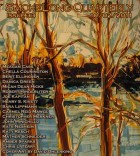The narrator sees ugliness all around her: neon lights like insect traps, crime scene tape, torn stockings, drapes heavy with smoke. Why has she come back here?
Atlantic City in winter — it’s the end of the line. All these despondent souls feeding the slots, playing games of chance — still vaguely hoping their lives could change even though they haven’t a penny or a prayer — makes the place that much sadder, more awful, somehow.
The narrator seems preoccupied with her own death: mentioning “a life only one can leave,” as well as her willingness to open the door to anyone. Is she determined to die or just taking chances?
The narrator has come to entertain, not necessarily fulfill, a death wish fantasy. Atlantic City — long absent of glamor, its beaches wildly deserted, the broken, garish remains of casinos, compounded by the scent of childhood memory — there is no other setting. The snow adds to her desolation, while at the same time making the scene beautiful — outside her window lies terrible and terrific beauty.
The sense of time and reality is blurred. For instance, when she thinks of ordering strawberries, and in the next sentence we see them arrive, but then, in the next sentence, she hasn’t ordered them yet. How does this reflect the state of mind of the narrator?
It’s a claustrophobic story. The story is entirely interior — her thoughts, her observations triggering memory, the fluidity of time, (strawberries are toyed with as an emblem of decadence and decay, but they are never ordered), so maybe there is a looseness there but all of it is contained in a sort of capsule because that is how the narrator lives, closed off, not only alone but in absolute loneliness. There is no physical action in the piece, no forward motion, no penetration from the outside world until the knock on her door. Until she says open.
We learn that April had many symptoms that no one took seriously, and earlier in the story, you write, “absence killed April.” How does the narrator believe she died?
“I could die”, she says, “the sugar.” So began her wolf cry — April’s desperate plea for someone to sit up and notice. “Absence killed April” — the indifference, the self-absorption of her parents, so that her life became a series of complaints, the hypochondria an obsession, its own sickness — a way of dealing with lack. Of course, this had the numbing effect of a child crying wolf — she was ignored, and then she died. Now, here is the narrator, mirroring her sister, so that this interior monologue becomes her own wolf cry — for connection, despite all odds, a final indulgent spin for hope. One knock could save her. If only. As if –
Can you tell me a little about the Sunday Salon?
Sure. The Salon is a monthly reading series founded in the summer of 2002 by fellow New School MFA alum and all-out superstar Nita Noveno. Although the venue has changed over the years, from Morningside Heights to Williamsburg to its current spot at Jimmy’s 43 in the East Village, it’s always welcomed a diverse and refreshing mix of emerging and established writers. We just kicked off our fall season, and have some incredible lineups planned (psst…. including a special night with Smokelong authors Kathy Fish, Ethel Rohan, and Jen Michalski — as well as Heather Fowler — on October 16.) Nita is a tireless champion of literature, our readers blow us away, the crowd is good energy, and Jimmy’s our dark and cozy home, where the beer is tasty, the burgers evenly charred.



 The core workshop of SmokeLong Fitness is all in writing, so you can take part from anywhere at anytime. We are excited about creating a supportive, consistent and structured environment for flash writers to work on their craft in a community. We are thrilled and proud to say that our workshop participants have won, placed, or been listed in every major flash competition. Community works.
The core workshop of SmokeLong Fitness is all in writing, so you can take part from anywhere at anytime. We are excited about creating a supportive, consistent and structured environment for flash writers to work on their craft in a community. We are thrilled and proud to say that our workshop participants have won, placed, or been listed in every major flash competition. Community works.